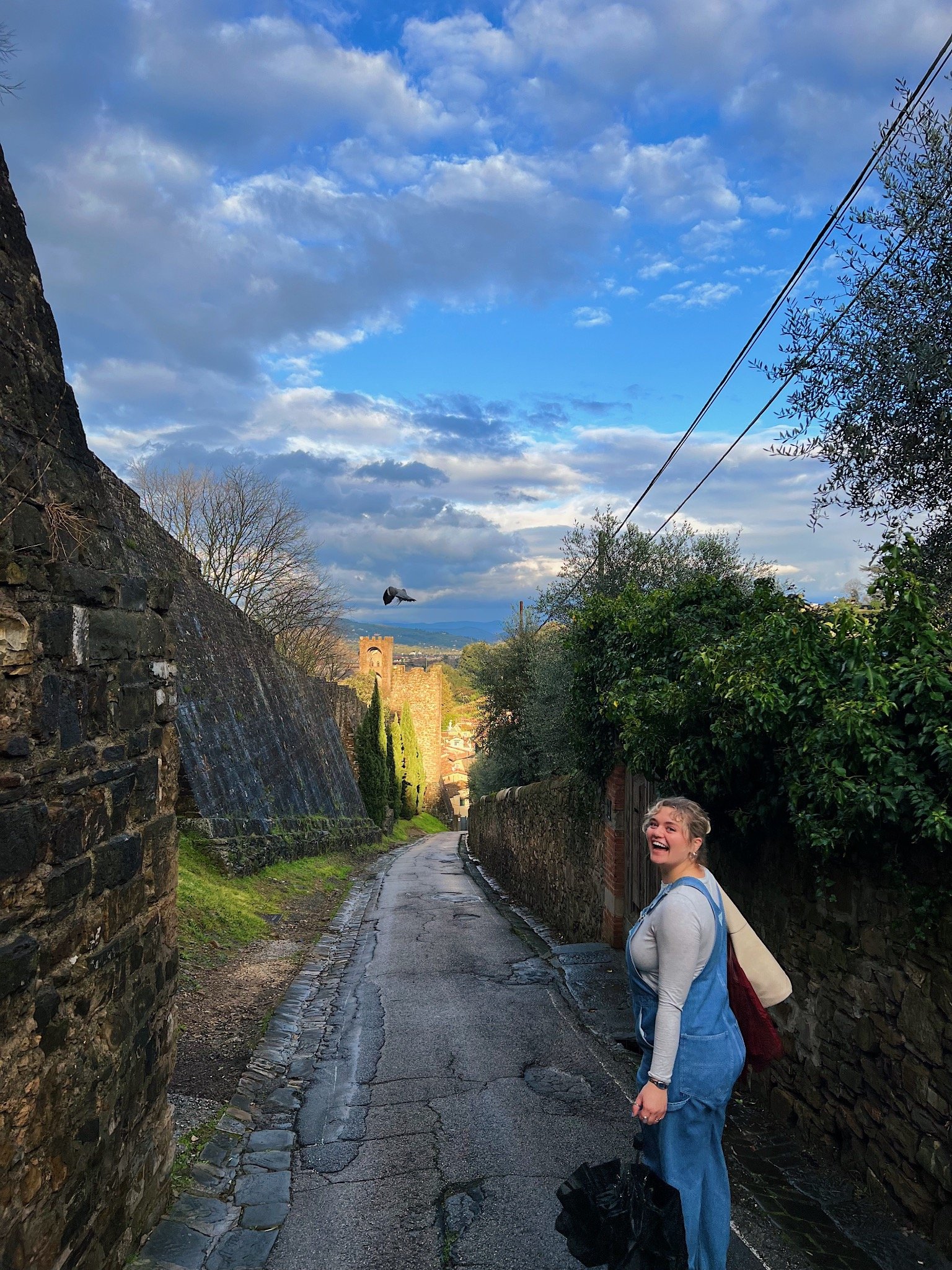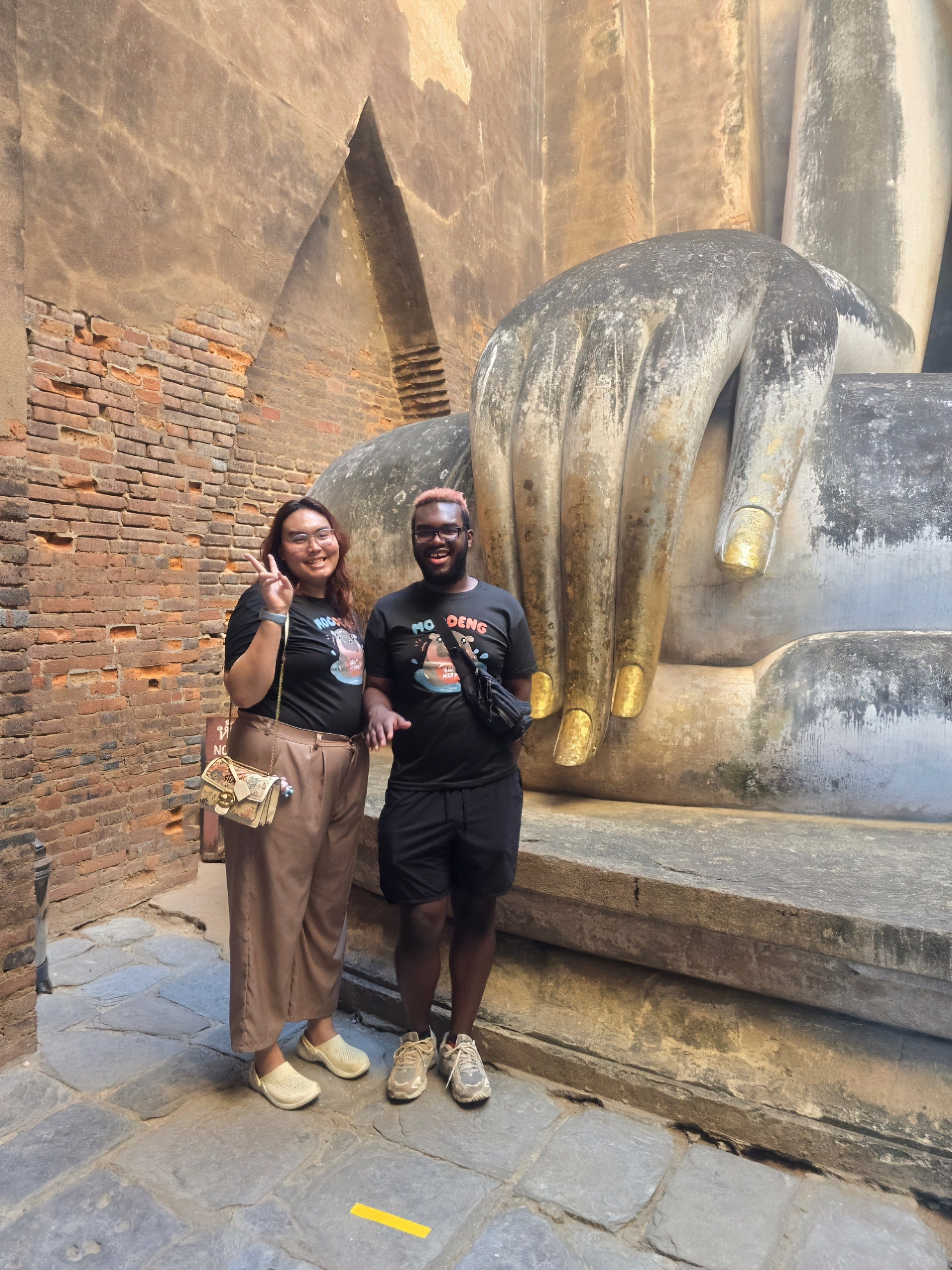Hi there! I’m Lauren Olson. I’m double-majoring in Gender Studies and Media Studies with a concentration in Creative Advertising at Indiana University Bloomington. As my semester abroad in Florence, Italy comes to a close, I am reflecting on how earning my cross-cultural agility microcredit helped me get the most out of my program. One of the main things my microcredit has given me is a stronger sense of self-confidence and independence, by prompting me to contemplate how much I’ve accomplished since the start of my program, on a personal and professional level.
 I’m going to focus on the personal for this post. As someone living with generalized anxiety and depression, making the choice to study abroad was not an easy one. Moving to another continent for an extended period of time seemed extremely daunting at first. I think this is a fairly common experience, anxiety diagnosis or not. So, I’d like to hopefully alleviate some worries for prospective students by sharing my top 5 study abroad anxieties and how I handled them.
I’m going to focus on the personal for this post. As someone living with generalized anxiety and depression, making the choice to study abroad was not an easy one. Moving to another continent for an extended period of time seemed extremely daunting at first. I think this is a fairly common experience, anxiety diagnosis or not. So, I’d like to hopefully alleviate some worries for prospective students by sharing my top 5 study abroad anxieties and how I handled them.
Quick disclaimer: I am by no means a mental health professional. I am simply sharing my experiences and what worked for me. Let’s get into it!
My Top 5 Study Abroad Anxieties and How I Handled Them
(in no particular order)
1. Making new friends
I came into my semester abroad knowing absolutely no one. As someone with social anxiety, I was kind of expecting it to be a bit of a nightmare. In the beginning, it seemed like everyone knew each other, which was only partly true. Some people do come to study abroad with their friends from home, but I quickly realized there were plenty of other people who came in alone, too.
Regardless of whether you come with friends or by yourself, studying abroad is a major adjustment. You’re all in the same boat. Once I reminded myself of this, it became much easier to step outside of my comfort zone and open up to the people around me. Now, three months in, I have a tight-knit group of friends who I travel with on the weekends and hangout with during the week. It can feel terrifying to put yourself out there when meeting new people, but trust me, it is so worth it!
2. Sustaining back-home relationships and FOMO
 When I left to study abroad, one of my worries was that I wasn’t going to feel as close with my friends back home when I got back, and that I would miss out on so many memories they made without me. My program doesn’t end for another month, so I’m not home yet, but I can confidently say my mind was getting ahead of me with these thoughts. The reality of being abroad is that you’re going to make a lot of memories while you’re here, too, without your friends from back home. What I’m getting at is that it’s a two-way street. You’re going to miss your friends and your friends are going to miss you, too. You’re both going to wish you could be there experiencing life together.
When I left to study abroad, one of my worries was that I wasn’t going to feel as close with my friends back home when I got back, and that I would miss out on so many memories they made without me. My program doesn’t end for another month, so I’m not home yet, but I can confidently say my mind was getting ahead of me with these thoughts. The reality of being abroad is that you’re going to make a lot of memories while you’re here, too, without your friends from back home. What I’m getting at is that it’s a two-way street. You’re going to miss your friends and your friends are going to miss you, too. You’re both going to wish you could be there experiencing life together.
I’ve found that the best thing to do in this case is keep in touch, but be mindful of how you feel. If you miss someone, reach out. It can feel wonderful to talk to a familiar face. On the other hand, if you find yourself down a rabbit hole, thinking about all of the things you’re missing out on back home, pull back a little bit. Think about how many unforgettable things you’ve experienced while abroad, and use that to shift your mindset to gratitude. You are lucky to be here, and you’ve earned it. Try to live life day-by-day, and know there are people waiting to welcome you home again.
3. Money
 Money can be a big stressor at home. The thought of managing my money while abroad, to be honest, freaked me out a bit. I was used to having an income, as I worked during school at home. Working in a foreign country where I don’t speak the local language did not seem like a very good idea. Luckily, I had been working and saving beforehand, so I had a decent amount to work with for my time abroad. Once I had been living in Florence for a couple of weeks and had gotten a handle on how expensive daily living is here, I did some calculations. To figure out how I was faring financially, I calculated an estimate of how much money I thought I would spend a month, including rent for my apartment back home, groceries, hygiene products, travel, souvenirs, and a small emergency fund, just in case. I multiplied this amount by how many months I would be here, and subtracted it from my bank account. I won’t lie to you, I was cutting it pretty close. However, since I actually figured out how much money I was working with, it gave me the peace of mind that I would be alright, if I was careful. Now, three months in, I haven’t run out yet, so I call that a win. I would highly recommend doing some money math at the beginning of your program, instead of neglecting to monitor your finances, and running into trouble later on.
Money can be a big stressor at home. The thought of managing my money while abroad, to be honest, freaked me out a bit. I was used to having an income, as I worked during school at home. Working in a foreign country where I don’t speak the local language did not seem like a very good idea. Luckily, I had been working and saving beforehand, so I had a decent amount to work with for my time abroad. Once I had been living in Florence for a couple of weeks and had gotten a handle on how expensive daily living is here, I did some calculations. To figure out how I was faring financially, I calculated an estimate of how much money I thought I would spend a month, including rent for my apartment back home, groceries, hygiene products, travel, souvenirs, and a small emergency fund, just in case. I multiplied this amount by how many months I would be here, and subtracted it from my bank account. I won’t lie to you, I was cutting it pretty close. However, since I actually figured out how much money I was working with, it gave me the peace of mind that I would be alright, if I was careful. Now, three months in, I haven’t run out yet, so I call that a win. I would highly recommend doing some money math at the beginning of your program, instead of neglecting to monitor your finances, and running into trouble later on.
4. Travel
 I’d never travelled alone before studying abroad, save for the occasional train or bus trip. Once I got to Florence, I realized that traveling on the weekends is pretty much the norm for study abroad students. I didn’t have much of a clue how to find the best flight or train ticket. Luckily, the people I met and ended up travelling with knew a bit more than I did. With their help and a little research, I’ve pretty much gotten it down to a science. For discount flights around Europe, Ryanair and Skyscanner are your best friends. Ryanair flights are generally less expensive than other airlines, and Skyscanner helps you find the cheapest flights available. I like to use the Omio app for trains and bus trips, as it is very easy to navigate and the prices are relatively fair, depending on where you’re going and how fast you want to get there. One of the main things I would say about travelling in Europe is to try and go with the flow. Train and public transportation strikes are fairly common here, and can mess with your travel plans. Trains run late sometimes, causing you to miss your connection. The best thing to do in these situations is try to remain calm and locate other modes of transportation or the next connection to get you back on track. Travel is both a learning and bonding experience. Embrace it.
I’d never travelled alone before studying abroad, save for the occasional train or bus trip. Once I got to Florence, I realized that traveling on the weekends is pretty much the norm for study abroad students. I didn’t have much of a clue how to find the best flight or train ticket. Luckily, the people I met and ended up travelling with knew a bit more than I did. With their help and a little research, I’ve pretty much gotten it down to a science. For discount flights around Europe, Ryanair and Skyscanner are your best friends. Ryanair flights are generally less expensive than other airlines, and Skyscanner helps you find the cheapest flights available. I like to use the Omio app for trains and bus trips, as it is very easy to navigate and the prices are relatively fair, depending on where you’re going and how fast you want to get there. One of the main things I would say about travelling in Europe is to try and go with the flow. Train and public transportation strikes are fairly common here, and can mess with your travel plans. Trains run late sometimes, causing you to miss your connection. The best thing to do in these situations is try to remain calm and locate other modes of transportation or the next connection to get you back on track. Travel is both a learning and bonding experience. Embrace it.
5. Navigating life without my usual support system
This was one of my biggest worries going into study abroad. At home, I saw a therapist monthly and I had friends and family who understood me and my anxiety relatively close-by. As my therapist isn’t licensed internationally, we’ve had to pause our sessio ns until I get home. I wouldn’t call myself dependent on them by any means, but our appointments were regulating and beneficial for me.
ns until I get home. I wouldn’t call myself dependent on them by any means, but our appointments were regulating and beneficial for me.
Going without them for a few months seemed pretty daunting to me. However, I have been able to rely on the coping mechanisms she taught me during my time here, and I am doing just fine. This is not without difficulty, of course, but I am okay. One practice I find especially helpful is journaling. I have been doing this for years now, and it really helps to get my thoughts out of my brain and onto paper, as a way to let them go.
As for my friends and family, they are still very much there for me. It may not be through in-person conversations, and the time difference does make things more difficult, but I most definitely still have an active support system. Not to mention the friends I’ve made here in Florence; I have found comfort in them numerous times, as we share similar struggles and understand how being away from home can be difficult sometimes. Trust yourself and ask for support when you need it, and you’ll be more than alright.
Throughout my study abroad experience, I have realized that I can make a home wherever I am. I can make new friends and keep my old ones, with minimal fear of missing out. I can navigate my finances and have learned about the complexities of European travel.
I can rely on myself and those around me for support when I need it. I would like to thank CIS Abroad and the Cross-Cultural Agility micro-credential program for prompting me to feel more confident about all of these aspects of my life. With their help, I have developed a sense of independence that will serve me well in the future.
Blog by Lauren Olson, Indiana University Bloomington, Semester in Florence





 I’m going to focus on the personal for this post. As someone living with generalized anxiety and depression, making the choice to study abroad was not an easy one. Moving to another continent for an extended period of time seemed extremely daunting at first. I think this is a fairly common experience, anxiety diagnosis or not. So, I’d like to hopefully alleviate some worries for prospective students by sharing my top 5 study abroad anxieties and how I handled them.
I’m going to focus on the personal for this post. As someone living with generalized anxiety and depression, making the choice to study abroad was not an easy one. Moving to another continent for an extended period of time seemed extremely daunting at first. I think this is a fairly common experience, anxiety diagnosis or not. So, I’d like to hopefully alleviate some worries for prospective students by sharing my top 5 study abroad anxieties and how I handled them. When I left to study abroad, one of my worries was that I wasn’t going to feel as close with my friends back home when I got back, and that I would miss out on so many memories they made without me. My program doesn’t end for another month, so I’m not home yet, but I can confidently say my mind was getting ahead of me with these thoughts. The reality of being abroad is that you’re going to make a lot of memories while you’re here, too, without your friends from back home. What I’m getting at is that it’s a two-way street. You’re going to miss your friends and your friends are going to miss you, too. You’re both going to wish you could be there experiencing life together.
When I left to study abroad, one of my worries was that I wasn’t going to feel as close with my friends back home when I got back, and that I would miss out on so many memories they made without me. My program doesn’t end for another month, so I’m not home yet, but I can confidently say my mind was getting ahead of me with these thoughts. The reality of being abroad is that you’re going to make a lot of memories while you’re here, too, without your friends from back home. What I’m getting at is that it’s a two-way street. You’re going to miss your friends and your friends are going to miss you, too. You’re both going to wish you could be there experiencing life together. Money can be a big stressor at home. The thought of managing my money while abroad, to be honest, freaked me out a bit. I was used to having an income, as I worked during school at home. Working in a foreign country where I don’t speak the local language did not seem like a very good idea. Luckily, I had been working and saving beforehand, so I had a decent amount to work with for my time abroad. Once I had been living in Florence for a couple of weeks and had gotten a handle on how expensive daily living is here, I did some calculations. To figure out how I was faring financially, I calculated an estimate of how much money I thought I would spend a month, including rent for my apartment back home, groceries, hygiene products, travel, souvenirs, and a small emergency fund, just in case. I multiplied this amount by how many months I would be here, and subtracted it from my bank account. I won’t lie to you, I was cutting it pretty close. However, since I actually figured out how much money I was working with, it gave me the peace of mind that I would be alright, if I was careful. Now, three months in, I haven’t run out yet, so I call that a win. I would highly recommend doing some money math at the beginning of your program, instead of neglecting to monitor your finances, and running into trouble later on.
Money can be a big stressor at home. The thought of managing my money while abroad, to be honest, freaked me out a bit. I was used to having an income, as I worked during school at home. Working in a foreign country where I don’t speak the local language did not seem like a very good idea. Luckily, I had been working and saving beforehand, so I had a decent amount to work with for my time abroad. Once I had been living in Florence for a couple of weeks and had gotten a handle on how expensive daily living is here, I did some calculations. To figure out how I was faring financially, I calculated an estimate of how much money I thought I would spend a month, including rent for my apartment back home, groceries, hygiene products, travel, souvenirs, and a small emergency fund, just in case. I multiplied this amount by how many months I would be here, and subtracted it from my bank account. I won’t lie to you, I was cutting it pretty close. However, since I actually figured out how much money I was working with, it gave me the peace of mind that I would be alright, if I was careful. Now, three months in, I haven’t run out yet, so I call that a win. I would highly recommend doing some money math at the beginning of your program, instead of neglecting to monitor your finances, and running into trouble later on. I’d never travelled alone before studying abroad, save for the occasional train or bus trip. Once I got to Florence, I realized that traveling on the weekends is pretty much the norm for study abroad students. I didn’t have much of a clue how to find the best flight or train ticket. Luckily, the people I met and ended up travelling with knew a bit more than I did. With their help and a little research, I’ve pretty much gotten it down to a science. For discount flights around Europe, Ryanair and Skyscanner are your best friends. Ryanair flights are generally less expensive than other airlines, and Skyscanner helps you find the cheapest flights available. I like to use the Omio app for trains and bus trips, as it is very easy to navigate and the prices are relatively fair, depending on where you’re going and how fast you want to get there. One of the main things I would say about travelling in Europe is to try and go with the flow. Train and public transportation strikes are fairly common here, and can mess with your travel plans. Trains run late sometimes, causing you to miss your connection. The best thing to do in these situations is try to remain calm and locate other modes of transportation or the next connection to get you back on track. Travel is both a learning and bonding experience. Embrace it.
I’d never travelled alone before studying abroad, save for the occasional train or bus trip. Once I got to Florence, I realized that traveling on the weekends is pretty much the norm for study abroad students. I didn’t have much of a clue how to find the best flight or train ticket. Luckily, the people I met and ended up travelling with knew a bit more than I did. With their help and a little research, I’ve pretty much gotten it down to a science. For discount flights around Europe, Ryanair and Skyscanner are your best friends. Ryanair flights are generally less expensive than other airlines, and Skyscanner helps you find the cheapest flights available. I like to use the Omio app for trains and bus trips, as it is very easy to navigate and the prices are relatively fair, depending on where you’re going and how fast you want to get there. One of the main things I would say about travelling in Europe is to try and go with the flow. Train and public transportation strikes are fairly common here, and can mess with your travel plans. Trains run late sometimes, causing you to miss your connection. The best thing to do in these situations is try to remain calm and locate other modes of transportation or the next connection to get you back on track. Travel is both a learning and bonding experience. Embrace it. ns until I get home. I wouldn’t call myself dependent on them by any means, but our appointments were regulating and beneficial for me.
ns until I get home. I wouldn’t call myself dependent on them by any means, but our appointments were regulating and beneficial for me.